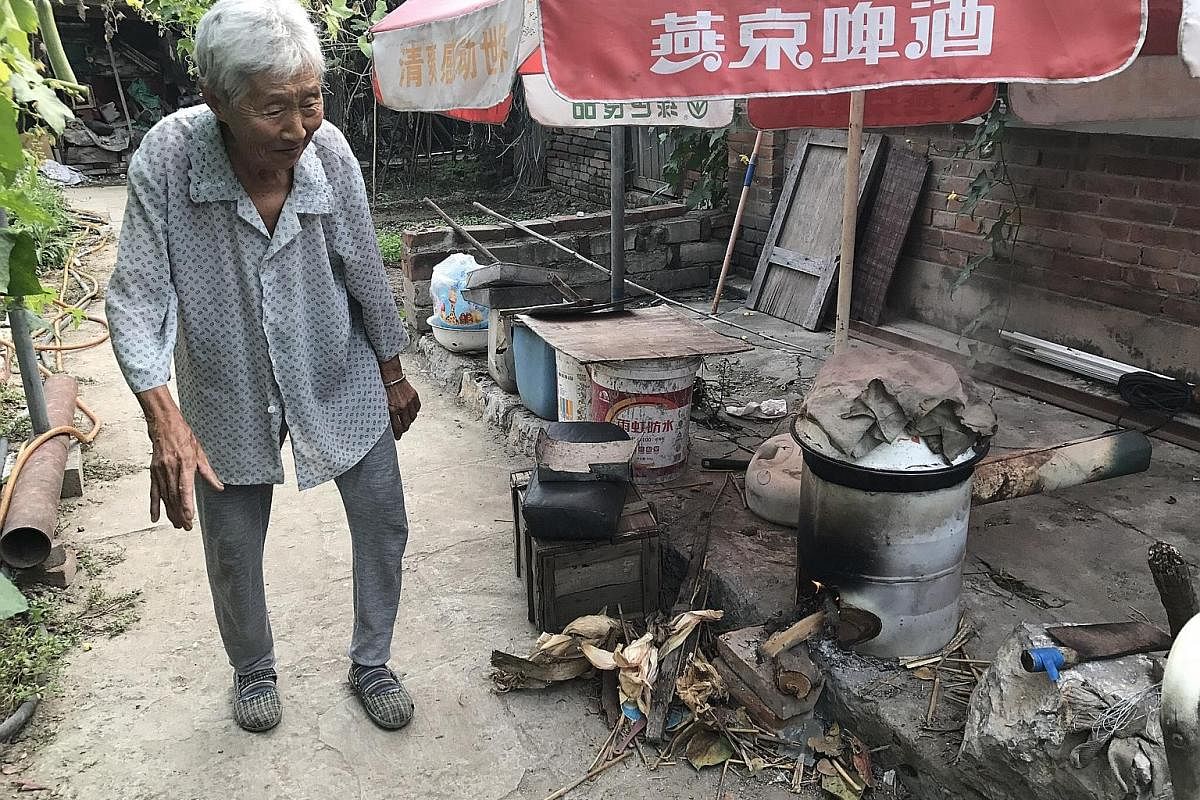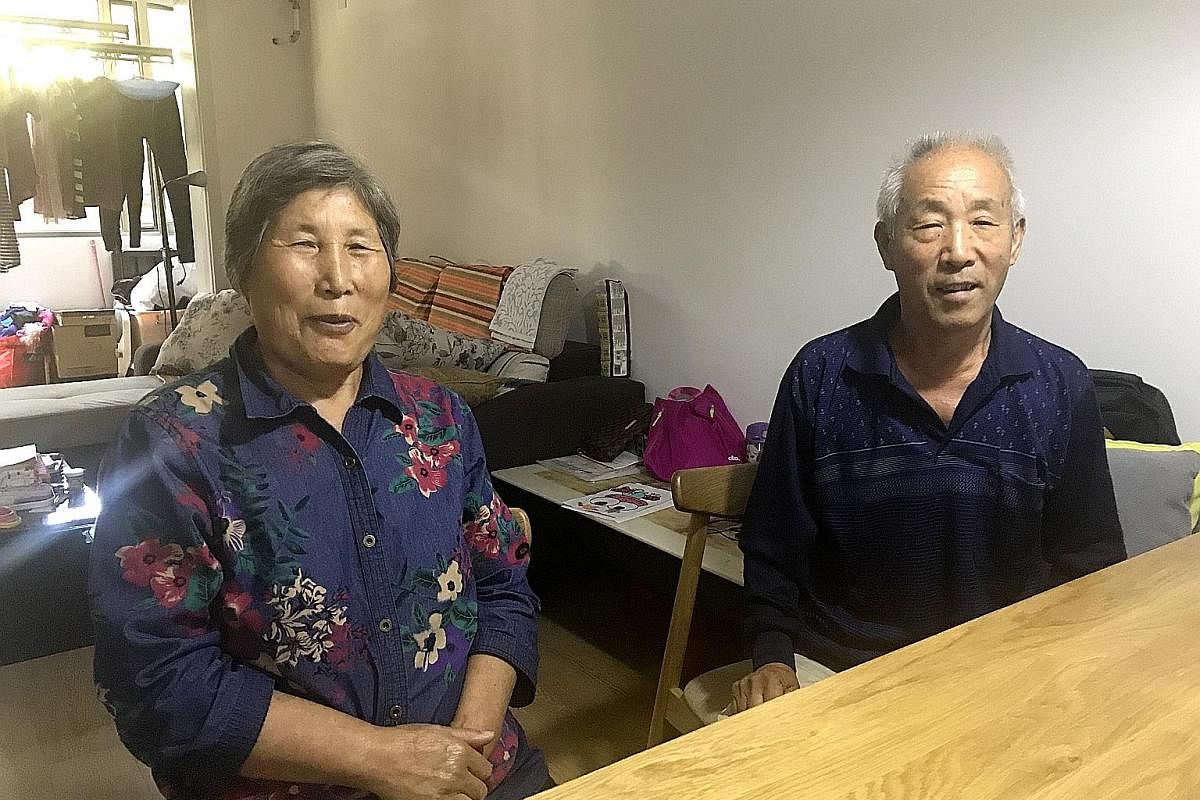-
230m Number of people aged 60 and above in China
Field notes
China's elderly: Old and left behind
Millions of China's elderly folk are left without care and support in the villages after their children move to the cities to live and work


Twenty years ago, farmer Zhang Fumin's two sons moved to the city to study. After graduating from university, they found jobs and settled down in Beijing.
Now in their 40s, the sons would visit their home village whenever possible, but the 72-year-old Mr Zhang and his wife Liu Xiuying, 70, are on their own most of the time.
The couple are what Chinese demographers call liu shou lao ren, or the "left behind" elderly.
Today, as China celebrates Chongyang Festival, or Seniors' Day, many of its 230 million elderly people aged 60 and above could be left on their own, without support and care. As of 2013, some 50 million were categorised as the "left behind" elderly.
"If you say that the developed Western countries are strolling into the phenomenon of an ageing population, China is sprinting into it," said population expert Yuan Xin from Nankai University in Tianjin. "The entire world's population is getting older. But China's path towards this end has its own unique characteristics," he told The Straits Times.
Its rapid transformation from an agrarian society to the world's second-largest economy comes with a heavy social cost: Millions of elderly people are "left behind" in the villages to fend for themselves in their old age after their children move to the cities to live and work.
These "left-behind" elderly folk are mostly found in villages in the western and central regions, hometowns to most of the 280 million migrant workers in the cities.
The country's "economic miracle" led to higher living standards and better health, with life expectancy now standing at 76.4 years. But it also led the fertility rate to fall to a record low of 1.7 births per woman last year.
Further compounding the greying crisis was the one-child policy from 1979 to 2015, said Dr Yuan.
By 2050, China will have 480 million elderly people, or one in every three people.
"This will put significant pressures on the pension and healthcare systems, as well as the economy as a whole," said population expert Zhou Haiwang from the Shanghai Academy of Social Sciences.
Experts warn that the demographic troubles could jeopardise the government's goals of developing China into a "moderately well-off society" by 2020 and a "powerful" nation by 2050.
GROWING OLD BEFORE GETTING RICH
China, one of Asia's ageing giants, may "get old before it fully succeeds in getting rich", while India's growing young population is just realising its economic potential, said Deloitte in a new study released last month.
To alleviate the crisis, families are now allowed to have a second child, and plans are under way to raise the retirement age from the current 60 for men and 55 for women working in the government and state-owned enterprises, and 50 for women in the private sector. Efforts are also being made to grow the elder-service industry to cater to the rapidly growing demands.
But the situation of the so-called "left behind" elderly in rural villages is particularly worrisome as these places lack healthcare infrastructure and social services, say the experts.
In the case of Mr Zhang, he receives a monthly pension of 600 yuan (S$120), a sum that includes the basic amount of 70 yuan set by the central government and the top-ups given by lower-level governments. And his wife gets nearly 1,000 yuan due to her role as a community leader in her younger days.
Their rural hukous (household registration accounts) state that they fall under the administration of the Beijing municipality, one of the richest in the country.
While the Zhangs may not get to enjoy as many benefits as Beijing's urban dwellers, their pension top-ups are among the highest in the country. Their electricity and water bills are also heavily subsidised.
Like their counterparts in other parts of China, the Zhangs grow their own vegetables and rear chickens and ducks.
"Many of the rural old people don't have their children by their side and, in some poor, remote areas, especially in the west, they each receive only the minimum (state) pension payout of 70 yuan a month," said Professor Zhou.
THE RURAL-URBAN DIVIDE IN DEMOGRAPHICS
China's population is ageng at different speeds: The situation is the worst in the north-east; people living in the western regions are ageing faster than those in the eastern regions; the cities are buffeted by young workers moving there in search of good-paying jobs.
The rural-urban divide is the most pronounced.
"Despite a lower life expectancy and a higher birth rate, the rural regions still lead the urban areas in growing older, faster," said Dr Yuan.
Most of the rural aged either continue working on the land to support themselves, or rely on their children for support in old age.
The children, as migrant workers in the cities, usually hold low-paying jobs and can barely make ends meet themselves.
"The government does not take up much responsibility for these old people," said Beijing-based economist Hu Xingdou.
But things have started to change as China pays more attention to its rural elderly.
President Xi Jinping, in his speech at the recent 19th national congress for the Chinese Communist Party, said tackling "unbalanced and inadequate" development is the government's next key focus.
He has promised to strengthen the social security system, including providing more support and care for the "left-behind" elderly in rural areas.
Rural residents did not have any retirement benefits until a nationwide pension system was introduced in 2009.
But this scheme is still lacking compared with that for urban residents, said Professor Hu, who studies societal trends.
But the situation is uneven across the country. Some local governments, especially those with deeper pockets, are able to take better care of their elderly.
Shanghai, for instance, has piloted a unified basic urban and rural pension system, which the central government has promised to roll out nationwide by 2020.
"Rural areas in eastern Jiangsu and Zhejiang provinces tend to do better in policies for the elderly as they are richer, and the rural economy is more well-developed," said Prof Zhou.
A recent documentary by state broadcaster CCTV said the government has spent 5 billion yuan in the past five years to set up 100,000 daycare and activity centres for the rural elderly and 110,000 community eldercare centres for the urban dwellers.
Dr Yuan explained that such centres for the elderly are sprouting up across the country as part of the central government's push to provide more old-age support in accordance with the 13th Five-Year Plan (2016 to 2020).
For example, a remote village in landlocked Hubei province has set up a home for "left-behind" elderly folk with no one to care for them.
For 10 yuan a day, the facility provides food, lodging, laundry service, entertainment and medical care for its 30 residents, reported Hubei Daily.
One of them is Mr Liu Dingcheng who moved in three years ago.
"When I used to live by myself in my ancestral home in the mountains, I nearly got into big trouble when I suffered a heart attack," said the retired farmer who is in his 70s. His two sons have left the village for work.
These centres, said Dr Yuan, also provide a place for the "left behind" elderly to socialise, make friends and feel less lonely.
Meanwhile, the Zhangs this month welcomed their first grandson. Their younger son and his wife now have a second child, two years after China relaxed its one-child policy. The couple have a seven-year-old daughter.
The elderly couple had moved in with their younger son in August to help take care of the older child.
But Mr Zhang hopes to return to Longwangtou village soon.
He said he does not mind being "left-behind" as long as his health and his wife's health permit.
"It will be troublesome if any one of us suffers from a serious illness," he said.
Join ST's Telegram channel and get the latest breaking news delivered to you.
A version of this article appeared in the print edition of The Straits Times on October 28, 2017, with the headline China's elderly: Old and left behind. Subscribe
